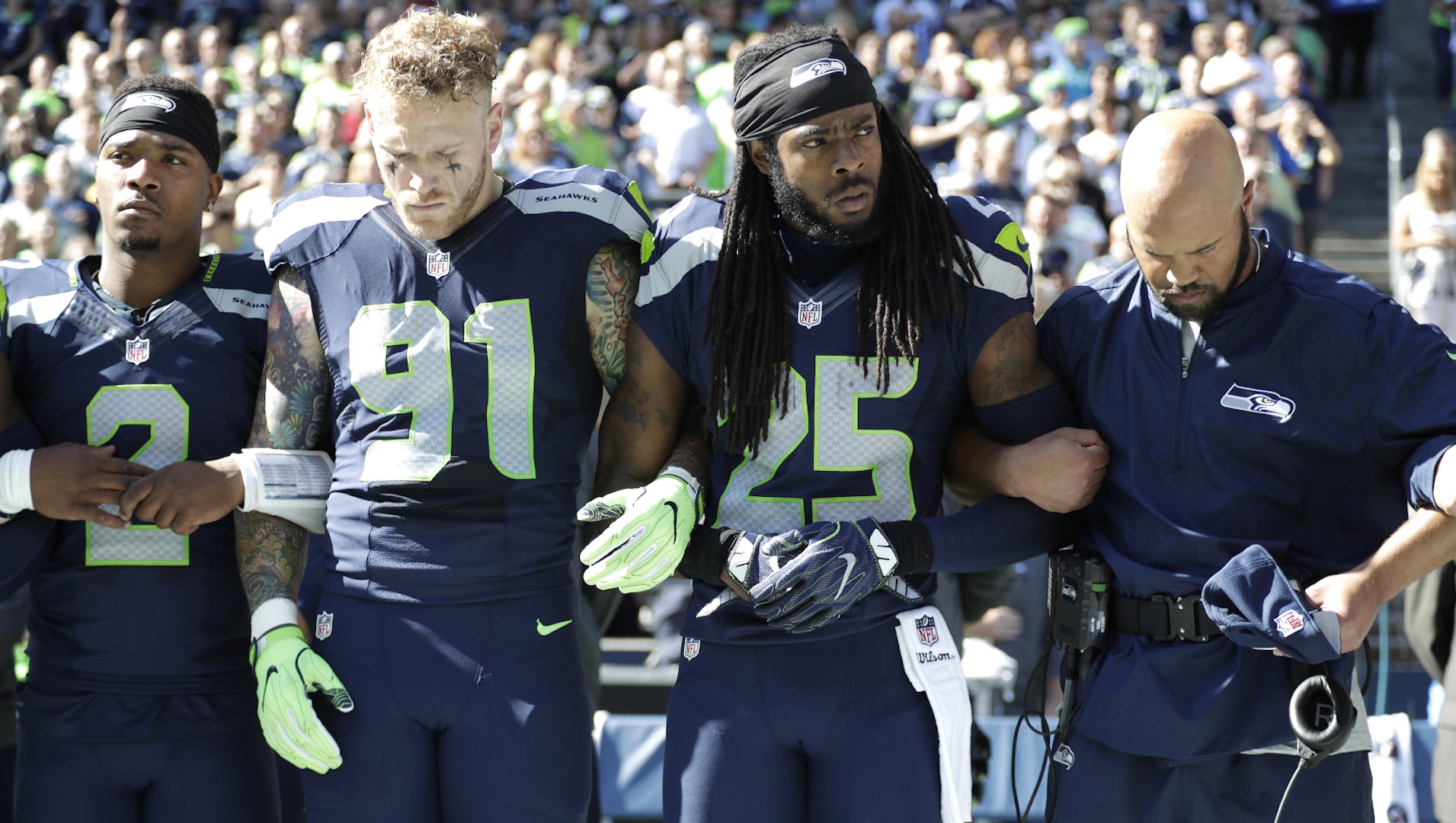Image via YouTube.
Black men make up 70 percent of the players in the NFL, according to a report by the University of Central Florida. And with a long history of racial injustice towards black people in the U.S, and continued racial disparities in police brutality, economics and wealth, and other aspects of systemic racial discrimination, it’s no wonder players in the NFL would use their platforms to address some of these issues.It’s why black athletes throughout history like Muhammad Ali, Tommie Smith and John Carlos, and Serena Williams, to name a few, have used their platforms to call attention to racial injustices. But recent efforts by athletes to call out police brutality and racial discrimination, by kneeling during the national anthem, has caused contentious debates within the NFL, and viewers at home alike. It has sparked remarks with hurtful racial-undertones; like from Houston Texans owner Bob McNair, who said “we can’t have the inmates running the prison.” Not to mention President Donald Trump calling the NFL players protesting sons of bitches. Racial justice group Color of Change is fighting to support athletes, their protests, and their activism.Color of Change, an online racial justice organization with more than one million members, leads campaigns and initiatives across the country to combat racism in the workplace, politics, within the criminal justice system, and everywhere else racial injustices may exist.The civil rights advocacy organization launched in 2005 in the aftermath of Hurricane Katrina, and has led campaigns to fight for justice for black lives since. That’s why when former San Francisco 49ers quarterback, Colin Kaepernick took his first knee last year during the national anthem to protest police brutality, Brandi Collins, a senior campaign director for Color of Change, told VICE Impact the organization delivered “comments of support for what he was doing” from the beginning.Since then, more NFL players, WNBA players, NBA players, and high school athletes have taken a knee during the national anthem to call attention to racial injustices. Color of Change has supported these efforts by leading campaigns, making calls to the NFL, and working with local activists in communities to support young athletes leading protests at their schools. In one example, the organization led a campaign to support Texas youth football team, Beaumont Bulls, who received backlash for kneeling during the national anthem, Collins told VICE Impact. And the fight continues.
Check out more videos from VICE:
For the month of November, Color of Change has declared this month “Athletes and Activism Month” through its #Superpowerchange initiative, which extends appreciation and support for athletes leading protests. The organization created the month of action in response to former and current NFL players; Michael Bennett, Malcolm Jenkins, Anquan Boldin, and Torrey Smith, who made an official request to NFL Commissioner Roger Goodell to make November an activism awareness month.Color of Change also created a petition to extend its support to NFL players and their protests and efforts to fight racial injustice without fear of backlash or repercussion. The petition called for the “league and owners to take substantive action directing financial support and ensuring public collaboration to further the player's platform of criminal justice reform.”Throughout November, Color of Change will create weekly petitions to address criminal justice reform issues, and to uplift local activists, host townhalls, and create and distribute video content to highlight key issues, among other efforts.Collins, senior campaign director of the Media, Democracy and Economic Justice department for Color of Change, spoke with VICE Impact about the reason behind the organization’s support for athlete’s activism.VICE Impact: Can you explain what the Media, Democracy and Economic Justice Department for Color of Change focuses on?Brandi Collins: The short answer is everything that’s not criminal justice. Whether it’s the ability to live a liveable wage, or the amount of debt you have to fall into to make a liveable wage, we do a lot of work around economic justice issues, and how we create a world in which people are able to work and thrive in our community. Everything from Silicon Valley and the role they play in our society [and] in shaping our experience, to media and how Hollywood tells the story of black folks. We look at local news and what’s stories are being told.There’s definitely this idea that athletes are there for our entertainment, they’re not actually there to have an opinion. Then you see these players who use their bodies to protest. When we see people use their platforms, we have to have their back.If you feel that the NFL players should have the right to engage in activism without fear of backlash from team owners or political figures then sign this petition from racial justice organization, Color of Change. By showing your support, you're telling the NFL to create a player's platform that will protect their right to protest and advocate for racial equality through criminal justice reform.
Advertisement
Advertisement
Check out more videos from VICE:

For the month of November, Color of Change has declared this month “Athletes and Activism Month” through its #Superpowerchange initiative, which extends appreciation and support for athletes leading protests. The organization created the month of action in response to former and current NFL players; Michael Bennett, Malcolm Jenkins, Anquan Boldin, and Torrey Smith, who made an official request to NFL Commissioner Roger Goodell to make November an activism awareness month.Color of Change also created a petition to extend its support to NFL players and their protests and efforts to fight racial injustice without fear of backlash or repercussion. The petition called for the “league and owners to take substantive action directing financial support and ensuring public collaboration to further the player's platform of criminal justice reform.”
Advertisement
Why do you think there’s so much backlash to athletes protesting?I think part of the reason why is because those actions, physical acts of protesting, forced forward a conversation that people really don’t want to have in this county. The experience of being black, a woman, a number of different categories, what justice looks like, what equality looks like. To have that conversation, that’s not a conversation folks want to have frankly.
Advertisement
Color of Change also just launched an effort in support of athletes stepping up for their beliefs. Check out their #superpowerchange campaign and consider standing in solidarity with athletes risking it all by standing up to bigotry and hatred.This interview has been edited for brevity and clarity
